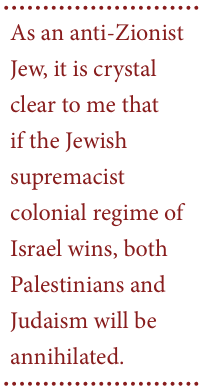This article was originally published on on January 3, 2024 in American for Middle East Understanding’s The Link (scroll down or download issue).
“There won’t be a ‘day after’ this genocide,” a friend in Nablus tells me on Signal. “The bombing may stop, but the project to erase Palestinians will persist in one form or another until Israel either wins or loses.”
True. We are in an existential fight against White Empire, and it won’t end just because Israel needs a bathroom break.
As an anti-Zionist Jew, it is crystal clear to me that if the Jewish supremacist colonial regime of Israel wins, both Palestinians and Judaism will be annihilated. Since I married a Palestinian and have Palestinian daughters, my mama bear energy is fully invested in the scenario where we all live together in equality with dignity, rights, and security for all.
But first, we must stop this goddamned genocide.
Like everyone, I’m running 24/7 with the heavy, sharp pieces of my broken soul dragging behind. Contemplating the “day after” feels like a Herculean task of acumen at a time when I can barely fathom reality.
Today, a friend in Rafah texted me on WhatsApp that he was depressed. What could I say? I replied,

Coming from someone who takes a hot shower every day, it sounds ridiculous. If I see him again when this is over, how will I look him in the eyes? I am overcome with shame about my powerlessness while he literally protects his small children with his body.
Yesterday another friend called me on Messenger from Khan Younis, chaos in the background. His daughter said, “Auntie, please tell Baba not to make us walk to Rafah.” My friend explained they are being forced to move from their shelter. He can’t afford a donkey cart, so the family of eight would have to go on foot, carrying whatever belongings they have left.
I didn’t know what to say.

Before this genocide, I stood on one side of a huge chasm. On my side were people who cared about houselessness, mass incarceration, discrimination, censorship. But many of those people have since planted “I Stand with Israel” signs on their lawns. I am dumbfounded! How can intelligent, decent people argue against a ceasefire? If it was wrong for 1,200 people to be killed, then isn’t it also wrong to kill 25,000?
How will I continue to work for social justice when I have lost faith in people?
Yet there are people who care:

When I read this tweet to my grownup daughter, her response surprised me. “What the fuck is the point of apologizing?” she erupted. “Palestinians never asked for pity.”
But I am sorry, I tell her. I’m so sorry. I’m so very, very sorry.

She says that like the woman of color in Samer’s tweet, my pain is from empathy not sympathy. “It’s happening to you too, mama,” she consoles, and I am momentarily relieved. But seconds later, an old colleague sends me photos of the shelter in Nuseirat camp. Feces is everywhere, and there is no water to clean up. How can I face her on the “day after” when all I have are empty platitudes like “May God protect you and keep you?”
My daughter reminds me that faith is inextricably ingrained into the Arabic language. The culture of collective care is upheld in every phrase. The idioms and invocations are not platitudes, she explains patiently. They manifest our hopes for others. The obligatory response, which is nearly always “praise to God,” shows how gratitude breeds strength. “Even during a genocide, every hard day lived is a privilege,” she tells me.
“Never hesitate to look them in the eye and reassure them, even though their wellbeing and liberation are not in your hands,” she says.
I nod, and I’m sure she feels my commitment across the long-distance phone line.
Because no matter what I do or don’t do, on the “day after,” whenever it comes, Palestinian steadfastness will be stronger than ever. And if my faith falters, my friends in Gaza will reassure me.
